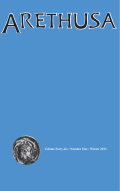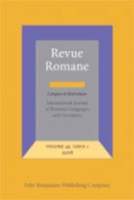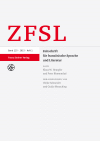
LILI-ZEITSCHRIFT FUR LITERATURWISSENSCHAFT UND LINGUISTIK
Scope & Guideline
Exploring the Intersection of Literature and Linguistics
Introduction
Aims and Scopes
- Interdisciplinary Approaches:
The journal emphasizes interdisciplinary methodologies, integrating perspectives from linguistics, literary studies, cultural studies, and media studies to address complex phenomena in literature and language. - Digital Humanities and Linguistics:
A significant focus on digital humanities reflects a commitment to exploring how digital tools and methodologies can enhance literary analysis and linguistic research, including corpus linguistics and hermeneutics. - Cultural and Historical Contextualization:
The journal frequently examines texts within their cultural and historical contexts, considering how identity, power dynamics, and socio-political factors shape literature and language. - Identity and Representation:
There is a consistent focus on themes of identity, particularly how language and literature construct and negotiate various identities, including gender, race, and social class. - Narrative and Discourse Analysis:
The journal explores narrative structures and discourse practices, analyzing how stories are constructed and communicated in various forms, including social media, fanfiction, and political discourse.
Trending and Emerging
- Digital Communication and Social Media:
There is a growing focus on how digital platforms shape communication, identity, and expressions of grief, reflecting societal shifts towards online interaction and the impact of technology on language. - Identity and Intersectionality:
Recent works increasingly address intersectional identities, examining how various social categories, including gender, ethnicity, and socio-economic status, intersect in literary and linguistic contexts. - Environmental Discourse:
The emergence of themes related to climate change and environmental discourse showcases the journal's responsiveness to global issues, exploring how literature and language engage with ecological concerns. - Popular Culture and Media Studies:
A trend towards analyzing popular culture and media representations indicates an expanding scope that examines how literature interacts with and reflects contemporary cultural phenomena. - Hermeneutics and Interpretation:
The exploration of hermeneutics, particularly in the context of digital and contemporary texts, signifies a renewed interest in understanding meaning-making processes within evolving frameworks.
Declining or Waning
- Traditional Literary Criticism:
There is a noticeable decrease in papers dedicated to traditional forms of literary criticism, suggesting a shift towards more contemporary and interdisciplinary approaches that engage with current sociocultural issues. - Historical Linguistics:
While historical linguistics has been a staple in earlier volumes, recent publications show a decline in this area, indicating a possible shift towards more modern linguistic analyses and applications. - Static Textual Analysis:
The journal is moving away from static textual analyses that do not consider the dynamic interactions between texts and their audiences, as newer studies prioritize interactive and participatory forms of engagement. - Focus on Canonical Literature:
There is a diminishing emphasis on canonical literature, with more attention being directed towards contemporary works and marginalized voices, reflecting a broader trend in literary studies.
Similar Journals

Moenia-Revista Lucense de Linguistica & Literatura
Cultivating a Platform for Transformative Academic DiscourseMoenia-Revista Lucense de Linguistica & Literatura, published by the esteemed Universidad de Santiago de Compostela, is a crucial academic journal dedicated to the fields of linguistics and literary studies. With its ISSN 1137-2346 and E-ISSN 2340-003X, this journal aims to advance scholarly discourse and provide a platform for innovative research in both linguistics and literature, with a particular focus on linguistic theories, literary analysis, and interdisciplinary approaches. The journal is categorized in the lower quartile (Q4) in its respective fields according to the latest metrics, including Scopus rankings, which place it within the challenges of the arts and humanities. Although currently not open access, it serves as an accessible resource for researchers and enthusiasts alike who are keen to explore diverse methodologies and theoretical frameworks. With its commitment to fostering rigorous academic inquiry, Moenia stands as a vital resource for those looking to deepen their understanding of the intricate relationships between language and literature.

ARETHUSA
Exploring the Depths of Literature and Theory Since 1974ARETHUSA, published by the Johns Hopkins University Press, is a prestigious journal that aims to foster dialogue and scholarship in the fields of Classics, Cultural Studies, and Literature and Literary Theory. Since its inception, it has been recognized for its profound impact on academic research, reflected in its Q2 rankings across multiple categories. With an ISSN of 0004-0975 and an E-ISSN of 1080-6504, ARETHUSA embraces a comprehensive scope that encourages innovative discourse and critical analysis from 1974 through to 2024. Although the journal does not offer open access, its rigorous selection process ensures that only the highest quality research is published, making it a vital resource for scholars, professionals, and students dedicated to advancing knowledge in these interconnected disciplines. The journal's commitment to excellence is further demonstrated by its standing in various Scopus rankings, reinforcing its significance in the scholarly community.

Metacritic Journal for Comparative Studies and Theory
Navigating Complex Themes in Arts and Social Sciences.Metacritic Journal for Comparative Studies and Theory is a premier scholarly publication focusing on interdisciplinary research within the fields of Arts and Humanities, as well as Social Sciences. Published by UNIV BABES-BOLYAI, FAC LETTERS, PHANTASMA CTR IMAGINATION STUDIES, this Open Access journal has made significant strides since its inception in 2015, providing a platform for innovative comparative studies that inspire critical discourse. With an impressive Q2 ranking in both Arts and Humanities and Social Sciences, the journal showcases high-quality research that engages contemporary issues and theoretical frameworks. Its Scopus rankings further highlight its impact, with a noteworthy position in the 78th percentile for Arts and Humanities and 40th percentile for Social Sciences. As an accessible resource for researchers, professionals, and students, the journal encourages contributions that navigate complex themes of interpretation and imagination that resonate within and beyond Romanian scholarship. Discover the latest insights and foster collaborations in a dynamic academic landscape.

REVUE ROMANE
Bridging Cultures Through Linguistic and Literary DialogueREVUE ROMANE is a prestigious academic journal published by John Benjamins Publishing Co, located in the Netherlands. With a rich heritage dating from 1996 to 2024, this esteemed journal focuses on the dynamic interplay of *Linguistics* and *Literature*, making it an essential resource for scholars, researchers, and students alike. By showcasing a range of theoretical and empirical studies, the journal has positioned itself in the Q3 and Q2 quartiles for *Linguistics and Language* and *Literature and Literary Theory* respectively, reflecting its significant impact on these fields. With impressive Scopus rankings, including a notable 79th percentile in Arts and Humanities within Literature and Literary Theory, REVUE ROMANE serves as a critical platform for the exploration of both language and literary expressions, encouraging dialogues that bridge cultural and linguistic divides. Although it is not open access, its contributions are invaluable for advancing knowledge and fostering scholarly discourse in the realms of linguistic and literary investigation.

Letteratura e Letterature
Illuminating the Intersections of Literature and Language.Letteratura e Letterature is a distinguished scholarly journal dedicated to exploring the nuances of literature and linguistic theory, published by FABRIZIO SERRA EDITORE. This journal, identifiable by its ISSN 1971-906X and E-ISSN 1973-2600, serves as a significant platform for researchers, professionals, and students engaged in critical discourse within the fields of Literature and Linguistics. With a focus on fostering interdisciplinary dialogues, it seeks to illuminate diverse literary phenomena and linguistic intricacies, contributing meaningfully to the academic community. Despite being categorized in the Q4 and Q3 quartiles in 2023, the journal remains a vital resource, encouraging innovative scholarship and broadening the understanding of literary and linguistic interactions. Although it does not currently offer open access, the journal promises rigorous peer-reviewed content, ensuring the quality of published research. Operating from its base in Pisa, Italy, the journal continues to embrace its converged years from 2014 to 2021 and the ongoing 2023 to 2024 period as an era for refined scholarship and vibrant academic exchange.

Acta Neophilologica
Advancing linguistic frontiers with open access insights.Acta Neophilologica is a prestigious academic journal published by the University of Ljubljana, dedicated to advancing the field of linguistics and language studies. With its commitment to Open Access since 2010, this journal ensures that valuable research is readily accessible to a global audience, fostering innovation and collaboration among researchers, professionals, and students alike. Recognized in the 2023 Quartiles as Q1 in Linguistics and Language, Acta Neophilologica stands out as a premier platform for scholarly contributions that explore various dimensions of language, linguistics, and their societal impacts. The journal is indexed in Scopus, which reinforces its reputation within the academic community, ranking 588 out of 1088 in the Arts and Humanities category and 672 out of 1167 in Social Sciences. Researchers seeking to publish their work in a highly regarded outlet will find Acta Neophilologica a valuable forum for sharing their insights and findings, ensuring that their research reaches an engaged and knowledgeable readership.

Slavia-Casopis pro Slovanskou Filologii
Advancing Scholarship in Slavic Language and LiteratureSlavia-Casopis pro Slovanskou Filologii is an esteemed journal dedicated to the advancement of Slavic philology, published by the SLOVANSKY USTAV AKAD CESKE REPUBLIKY in the heart of the Czech Republic. With its ISSN: 0037-6736, the journal serves as a vital platform for scholarly exchange, embracing a rich academic tradition since its convergence years beginning in 2002. The journal has achieved notable recognition, with a Q3 ranking in Linguistics and Language and a Q2 in Literature and Literary Theory as of 2023, highlighting its contribution to these dynamic fields. Although it does not currently offer open access, its rigorous selection of articles ensures that it remains a crucial resource for researchers and practitioners alike, facilitating a deeper understanding of Slavic languages and literature. Scholars benefit from the journal's extensive research backdrop, enhanced by its current ranks in the Scopus database, underscoring its significant placement within the academic literature landscape. The editorial scope of Slavia promotes innovative inquiries that reflect cultural, historical, and theoretical perspectives endemic to Slavic studies, making it indispensable for professionals, students, and enthusiasts invested in the exploration of Slavic linguistic and literary heritage.

Caplletra
Exploring the Boundaries of Language and LinguisticsCaplletra is a distinguished open-access journal dedicated to the field of linguistics and language studies, published by PUBL ABADIA MONTSERRAT since its inception. Based in Barcelona, Spain, this journal has been a vital resource for researchers, professionals, and students engaged in the intricate explorations of language and its applications since its transition to open access in 2005. Despite its current quartile ranking of Q4 within the Linguistics and Language category as of 2023, Caplletra continues to serve as an inclusive platform, fostering a dialogue that encourages a diverse range of scholarly contributions. Covering an expansive scope in the converged years from 2018 to 2024, it plays a crucial role in disseminating innovative research and insights. With its ISSN 0214-8188 and E-ISSN 2386-7159, Caplletra is committed to making academic work accessible to all, enhancing the landscape of linguistic scholarship and reflecting the evolving nature of language studies.

ZEITSCHRIFT FUR FRANZOSISCHE SPRACHE UND LITERATUR
Illuminating the Nuances of French Language and Literary TheoryZEITSCHRIFT FUR FRANZOSISCHE SPRACHE UND LITERATUR, published by FRANZ STEINER VERLAG GMBH, serves as a notable platform for scholarly discourse in the fields of French language and literature. With an ISSN of 0044-2747 and an E-ISSN of 2366-2425, this German journal has established itself as a respected source for researchers, educators, and students alike who seek to deepen their understanding of linguistic and literary theory. Although it currently does not offer Open Access, its rigorous peer-reviewed articles contribute significantly to the discourse of the humanities. Despite its current Q4 ranking in Linguistics and Language, as well as in Literature and Literary Theory, the journal continues to strive towards enriching the academic landscape, encouraging innovative research and interdisciplinary approaches. With a history of converging from 1987, and recent publications making strides from 2018 to 2022, this journal appeals to those interested in exploring the nuances and complexities of French literature and linguistics, making it a valuable resource for advancing knowledge in these fields.

Romanica Olomucensia
Fostering Interdisciplinary Insights in the Arts and HumanitiesRomanica Olomucensia is a distinguished open-access academic journal published by Palacky University, Department of Romance Philosophical Faculty in the Czech Republic. With its commitment to fostering advanced research in the fields of Literature and Literary Theory as well as Linguistics and Language, this journal aims to provide a platform for scholars, researchers, and students to share their findings and insights. Since its inception, Romanica Olomucensia has consistently been recognized for its quality, securing a position in the Q2 category in the literature domain and achieving a Q3 ranking in linguistics per the 2023 category quartiles. The journal is indexed in Scopus, reflecting its standing in the academic community, with impressive ranks in various arts and humanities disciplines. It has been an open-access journal since 2018, promoting unrestricted access to all its publications, thus enhancing global academic outreach. With a focus on innovation and interdisciplinary studies, Romanica Olomucensia serves as an essential resource for anyone interested in the dynamic interplay of language and literature.